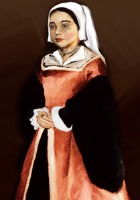Anne Askew
Anne Askew Poems
Like as the armed knight
Appointed to the field,
With this world will I fight
And Faith shall be my shield.
...
I am a woman poor and blind
and little knowledge remains in me,
Long have I sought, but fain would I find,
what herb in my garden were best to be.
...
Anne Askew Biography
Anne Askew (née Anne Ayscough or Ascue, married name Anne Kyme) (born 1520/1521 – died 16 July 1546) was an English poet and Protestant who was condemned as a heretic. She is the only woman on record known to have been both tortured in the Tower of London and burnt at the stake. She is also one of the earliest female poets to compose in the English language and the first Englishwoman to demand a divorce (especially, as an innocent party on scriptural grounds). Anne Askew was born in 1521 in Lincolnshire, England. William Askew, a wealthy landowner, was her father. William was a gentleman in the court of King Henry VIII, as well as a juror in the trial of Anne Boleyn's co-accused. William had arranged that his eldest daughter, Martha, be married to Thomas Kyme. When Anne was 15 years old, Martha died. William decided Anne would take Martha’s place in the marriage to Thomas. Anne was an avid Protestant. She studied the Bible and memorized verses. She was true to her belief for the entirety of her life. Unfortunately, Thomas was a Catholic, which resulted in a brutal marriage between Anne and him. Anne had two children with Thomas before he threw her out for being Protestant. It’s said that Anne was seeking to divorce him, so being kicked out did not upset her. Upon being thrown out, Anne moved to London. Here she met other Protestants and studied the Bible. Anne stuck to her last name Askew, rather than her husband’s name. While in London, Anne became a "gospeler" or a preacher. In March 1545, Thomas had Anne arrested. She was brought back to Lincolnshire, where Thomas demanded her to stay. The order was short lived, as Anne escaped and returned to London to continue preaching. In 1546 she was arrested again, but released. In May 1546 she was arrested again, and tortured in the Tower of London. (She is the only woman recorded to have been tortured there.) She was ordered to give up likeminded women, but Anne refused. The torturers, Lord Chancellor Thomas Wriothesley and Sir Richard Rich, attempted to torture Anne using a device called the rack, which stretches the persons limbs eventually causing dislocation. Anne refused to alter her beliefs. On June 18, 1546, Anne was convicted of heresy, and was condemned to be burned to death. July 16, 1546, Anne Askew was martyred in Smithfield, London. Due to the torture she endured, Anne had to be carried to the stake on a chair. She burned to death, along with three other Protestants, John Lassells, John Hemley ('a priest') and John Hadlam ('a tailor').)
The Best Poem Of Anne Askew
The Ballad Which Anne Askew Made And Sang When She Was In Newgate
Like as the armed knight
Appointed to the field,
With this world will I fight
And Faith shall be my shield.
Faith is that weapon strong
Which will not fail at need.
My foes, therefore, among
Therewith will I proceed.
As it is had in strength
And force of Christes way
It will prevail at length
Though all the devils say nay.
Faith in the fathers old
Obtained rightwisness
Which make me very bold
To fear no world's distress.
I now rejoice in heart
And Hope bid me do so
For Christ will take my part
And ease me of my woe.
Thou saist, lord, who so knock,
To them wilt thou attend.
Undo, therefore, the lock
And thy strong power send.
More enmyes now I have
Than hairs upon my head.
Let them not me deprave
But fight thou in my stead.
On thee my care I cast.
For all their cruel spight
I set not by their haste
For thou art my delight.
I am not she that list
My anchor to let fall
For every drizzling mist
My ship substancial.
Not oft use I to wright
In prose nor yet in rime,
Yet will I shew one sight
That I saw in my time.
I saw a rial throne
Where Justice should have sit
But in her stead was one
Of moody cruel wit.
Absorpt was rightwisness
As of the raging flood
Sathan in his excess
Suct up the guiltless blood.
Then thought I, Jesus lord,
When thou shalt judge us all
Hard is it to record
On these men what will fall.
Yet lord, I thee desire
For that they do to me
Let them not taste the hire
Of their iniquity.
Anne Askew Comments
Very nice job poem hunter. This would take me a very long time to find without your website

Anne spoke the truth about Romish Teaching. She is in glory now triumphant over all her enemies by Christs death and resurrection.